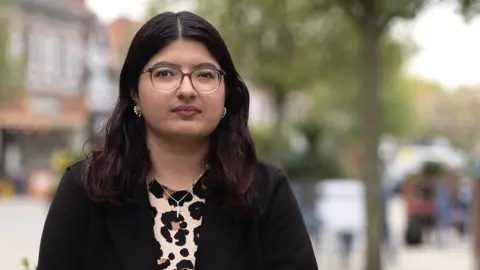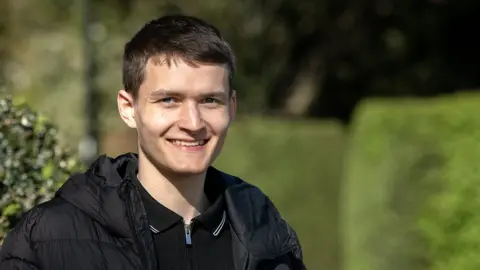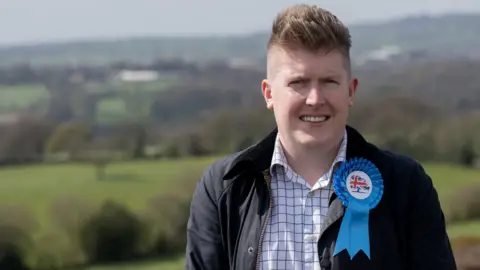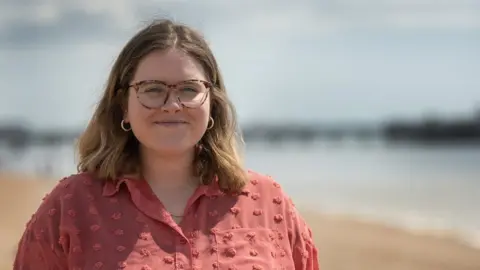Local elections 2023: Young councillors 'need seat at table'
 BBC
BBCWhen Tina Bhartwas was elected two years ago at the age of 19, she was the youngest ever councillor on Hertfordshire County Council.
But despite sitting on the board of a local charity, and her experience of campaigning for free school meals, she still had doubts about whether the role was for her.
"Growing up, I hadn't really seen anyone who looked like me on the council," she says.
"During my campaigns with the Labour Party, I made a lot of effort to try to engage women, people of colour and younger people and it was really difficult.
"So I felt that if I was trying to encourage those people, then I should actually be [standing] myself."
People can run for their local council at 18, but few do. Across England, the average age of councillors is around 60 - a figure that has barely changed in the last decade - and only 16% are under 45, according to the Local Government Association (LGA).
Tina, who is in her final year at university, believes this is partly because many children are not taught about politics at school, let alone what councils do. She admits she didn't even know councillors were elected until she joined the Labour Party at 17.
But she argues young people are interested in political issues and engaged on things like climate change.
She says councils need to do more to show how decisions made at a local level affect them. The 21-year-old believes young people can bring a different perspective but lived experience is not valued as much as it should be in politics.
Growing up in poverty and estranged from her family, she says she understands how councils can better support young people like her, through things like free bus passes and school meals.
"My ward is one of the most deprived in the county and it's important to me that other people don't go through what I've had to go through."

Representing the interests of young people in his area was also what persuaded 21-year-old Andrew Rushton to run for his local council.
He's standing for the first time for the Liberal Democrats in Lichfield, which is one of 230 areas in England with local elections on 4 May.
Andrew says he's had a mostly positive reaction from voters but as one of the youngest candidates in his area he found the experience nerve-wracking at first.
"I feel like the impression people get [is that] you're not cut out for the job, people question your experience," he says.
"But I actually think it's really important that young voices are heard because a lot of the things the council does affects young people."
He highlights areas like bus services and housing as key issues for his age group where councils can have an impact.
Andrew is currently in his final year at university and says it has been a challenge juggling campaigning with writing his dissertation and applying for graduate jobs.
With his weekends and evenings now spent delivering leaflets and speaking to voters, his social life has taken a backseat.
He admits being a little nervous about the prospect of starting a career alongside being a councillor if he's elected. But he says his friends have been supportive and he's confident he can manage the competing demands.


Councillors spend an average of 22 hours a week on their role, according to an LGA survey last year, which can potentially make it more difficult for young people who have children or are working or studying full-time.
The figures suggest only 20% of councillors work full-time alongside their council duties, while about 40% are retired.
Joe Porter, who was elected to Staffordshire Moorlands District Council in 2019, is also a full-time emergency service worker.
The 26-year-old Conservative says managing shift work with his council responsibilities hasn't always been easy. In the past he's had to use his holiday and lunch breaks to fit in council meetings, as well as holding twice-monthly surgeries and being on-call to residents.
Despite the amount of time many councillors devote to the role, they are not paid a salary. Instead they get an allowance, which is set by each council and varies significantly across England.

On average, it is about £7,000 a year, according to research by the TaxPayers' Alliance from 2020, although councillors with extra responsibilities - such as chairing committees or leading on a specific policy area - get more.
Joe doesn't believe he should get a full-time salary since being a councillor isn't a full-time role, but he does think pay should be looked at to encourage more young people to stand.
"Otherwise, you're restricting the pool of people to just those who can afford to do it."
He adds: "You don't do it for the money, you do it because you care about the community. But sometimes [money] can be a barrier."
Amy Heley, a Green Party councillor in Brighton, agrees. The 27-year-old says her allowance only covered her rent and bills once she got an additional payment for chairing a committee.
"It is much easier for older councillors, who typically own their homes and have retired or can afford to reduce their hours."
During her four years as a councillor, she's also done part-time jobs, completed a master's degree and now works full-time for a charity.
"It hasn't been easy and fitting so much in has impacted my mental health," she adds.

Amy argues that paying councillors more would allow people from all backgrounds to put themselves forward. However, she acknowledges that the strain on council budgets means, in practice, this would be "near impossible".
As a young councillor, she has faced other challenges. On two occasions, fellow councillors made disparaging comments about her age and were made to apologise after going through the council's standards procedures.
She also wants to see more support for tackling other challenges, like online abuse.
"Criticism about decisions or votes can very quickly become an all-consuming personal attack across social media and in the local press," she says, adding that at times she has felt "physically unsafe".
"The toxic culture and vitriol around politicians also plays a big part in stopping young people from putting themselves forward."
A survey of councillors and candidates by the LGA last year found 88% had experienced abuse or intimidation in relation to their role, most commonly via social media.
Amy is standing down as a councillor in May for a number of reasons, including a desire to progress her career and "the awful budgetary situation facing local government". But she feels she's learned a huge amount and more young people should get the opportunity to do the same.
"We should be part of the decisions that impact us," she says. "From preventing the worst of climate change, to dealing with the housing crisis, we need a seat at the table."
Photos by Emma Lynch
